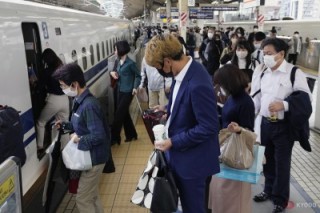Loading
Search
▼ Japan COVID Cases Rise 1st Time In 2 Months Amid Fears Of New Wave
- Category:Other
The number of weekly COVID-19 cases in Japan increased for the first time in about two months, health ministry data showed Thursday, as some health experts warned that the country has already entered a new wave of infections.
All 47 prefectures except Okinawa reported a rise in the number of new cases over the week through Wednesday, at a time concerns are growing about an eighth wave of infections with the country opening its doors to overseas visitors, the vaccination rate plateauing and the movement of people continuing to increase.
New infections across the country during the period rose 35 percent from the previous week, according to the Ministry of Health, Labor and Welfare.
More people are expected to travel toward the year-end after the government started the National Travel Discount program on Oct. 11 in a bid to spur local tourism.
Japan also removed its cap on daily overseas arrivals that day, easing coronavirus border controls that had been criticized by tourism and other industries at home and abroad for being too stringent.
The possibility of an eighth wave is "very high" considering the rise in new cases already seen abroad, the health ministry's COVID-19 advisory panel said in its latest analysis.
Coronavirus infections in European countries have been on an upward trend since September, according to the World Health Organization.
In France, weekly coronavirus cases numbered around 100,000 at the end of August, but have been steadily rising and hit 300,000 by the end of September.
Similarly in Germany, infections rose by 9 percent from the previous week to 640,000 in the week to Oct. 10.
Meanwhile, vaccine rates in Japan have been waning, with just 65.8 percent of those eligible jabbed three times, compared to over 80 percent who have been vaccinated twice as of Wednesday, according to data from the Prime Minister's Office.
By age, vaccination rates of those who have received three doses stood around the 50 percent range for people in their 20s and 30s, and at 64 percent for those in their 40s.
Children who have received a first and second dose have both remained around the 20 percent range.
The efficacy of a vaccine, as well as natural immunity following an infection, is said to wane over the span of a few months.
With some data calculating that less than 50 percent of people in their 60s and younger may have resistance to the BA.4 and BA.5 Omicron subvariants, Haruo Ozaki, chairman of the Tokyo Medical Association, implored people to get a fourth and fifth shot.
Hiroshi Nishiura, a professor at Kyoto University, noted that the country was already under an eighth wave of coronavirus infections, adding it was likely to gain momentum from the end of October.
As the government continues to ease restrictions, "it would not be surprising if infection numbers surpass those from the seventh wave," he said.
Tokyo on Thursday logged 3,489 daily coronavirus cases, above the capital's seven-day rolling average of 3,277.4 per day.
- October 21, 2022
- Comment (0)
- Trackback(0)


